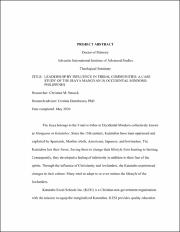| dc.description.abstract | The Iraya belongs to the 9 native tribes in Occidental Mindoro collectively known
as Mangyans or Katutubos. Since the 15th century, Katutubos have been oppressed and
exploited by Spaniards, Muslim rebels, Americans, Japanese, and lowlanders. The
Katutubos lost their forest, forcing them to change their lifestyle from hunting to farming.
Consequently, they developed a feeling of inferiority in addition to their fear of the
spirits. Through the influence of Christianity and lowlanders, the Katutubo experienced
changes in their culture. Many tried to adapt to or even imitate the lifestyle of the
lowlanders.
Katutubo Excel Schools Inc. (KESI) is a Christian non-government organization
with the mission to equip the marginalized Katutubos. KESI provides quality education
based on spiritual, academic, and practical foundations. KESI envisions its students as
educated Christian ambassadors in their tribal communities.
The purpose of this study was to investigate how KESI high school students can
exert leadership in their tribal communities. Therefore, first this study analyzed the
concept of leadership in the tribal context. Second, the study investigated possibilities for
KESI graduates to exert influence.
This qualitative research used the exploratory case study design. Data were
collected through individual and focus group interviews, observations, and available
literature. The research participants included KESI high school students, parents, village
leaders, a village judge, a KESI alumnus, and the KESI administrator.
The study revealed a coexistence of the traditional leadership through elders and
formal leadership based on local government unit structure in the tribal villages.
Important themes in tribal leadership are authority, personality, and knowledge. The
research demonstrated that KESI graduates will probably neither become traditional nor
formal leaders. Instead of leading through position, KESI graduates will exert their
influence indirectly through example in personality and spirituality, lifestyle and
performance, and knowledge and education.
A contextualized tribal leadership model was developed. It explains how tribal
communities can be influenced for a positive change. At the end, specific
recommendations for KESI are given to equip its high school students for the task ahead.
This research may benefit not only KESI but also other projects helping the marginalized
tribal people of Mindoro. | en_US |

